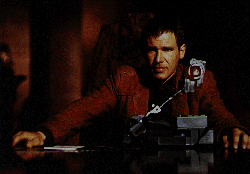

It is difficult to be ambivalent about Blade Runner: You either like it or
dislike it intensely--or both. Critics, for the most part, disliked Harrison
Ford's low-key performance in the leading role, hated the graphic violence and
found the story uninspiring. Some dared to admit they liked the film, and even
called it the best science-fiction film of the 1980s. All were unanimous in their
praise of the visual effects.
Similarly, audiences were either overwhelmed by the oppressive settings and
violence or exhilarated by director Ridley Scott's vivid vision of the future
which, according to one reviewer, "sticks with you like a recurrent nightmare."
Viewers expecting Indiana Jones or Han Solo were also put off by Ford's laconic
portrayal of the film noir detective. But everyone felt the impact of Scott's
milieu.

On first viewing, the film can be overwhelming: characters compete with the
environment for your attention, the past of 40 years ago clashes with the future
40 years hence, and expectations are repeatedly shattered as the status of
characters constantly changes. The viewer is thrust abruptly into a future in
which humans and androids (replicants) coexist uneasily, and errant androids are
hunted and "retired" by Blade Runners like Deckard (Harrison Ford). Deckard's
love for the replicant Rachael (Sean Young) -- whom he has orders to kill --
unfolds within this intensely drawn setting.

You experience vertigo as a spinner car spirals down onto the roof of police
headquarters, the minute lights of traffic moving in the streets 700 stories
below. You see the city in infinitely rich detail as Deckard experiences it: the
endless city lights extending beyond the pyramids, congested elevated highways in
the distance, the constant background of air traffic controller instructions, and
the car video screens misaligned from constant abuse. You hold your breath high
above the street and hang with Deckard by wet, slipping fingers until your
strength is drained.
Streets swarm with a bizarre mass of humanity and trash
that accumulates faster than it can be removed. Strange faces, incomprehensible
signs, and queer sounds help create a mixture of the foreign and the familiar.
You feel alive in a future you can actually touch and feel -- a frightening and
exciting place filled with beauty, wonder, decay and violence.

Critics singled out Blade Runner's unrealistic Hollywood ending, which
does not make artistic or logical sense, as a major flaw. The first cut concluded
with Deckard and Rachael entering the elevator and doors closing. The producers,
in response to preview audiences in Denver and Dallas who found this
European-style ending too bleak and ambiguous, added footage (reportedly from The
Shining) and extended Rachael's lifespan, which is inconsistent with the entire
mood of the movie and the tragedy in Deckard and Rachael's situation. Some
critics think this was done because the film was so uniquely depressing in a
period of otherwise upbeat movies such as ET, Tron, and Star
Trek II.
In an earlier version of the script, Rachael has Deckard take her to an isolated
snow-covered spot in the country she saw in one of his pictures. To Rachael, the
great advantage of being alive was to have a choice; she chose the only way she
could avoid capture. Deckard unwillingly retires her, rationalizing that if he
didn't someone else would. For Deckard, replicant and human had become
inseparable -- the difference was beyond understanding; for a short time they had
made each other human. In the shooting version of the script, Rachael and
Deckard escape in his spinner. From previous clues such as a dream sequence in
which Deckard sees a unicorn, a glow in his eyes similar to that of the
replicants and the final rooftop exchange with Gaff, Deckard realizes that he,
the replicant Batty and Rachael are the new people, made for this world. He sees
a tiny blip on his spinner display screen -- Gaff in hot pursuit -- and his
closing line is, "God help us all!" This ending, which implies that Deckard is in
fact a replicant him self, calls into question the film's explicit premises.
But however we interpret the movie, it is both intelligent and thought provoking.
It shows the tragedy of becoming inhuman by fighting inhumanity. It forces us to
ask what happens if we cannot trust our memories; we rely on memory completely
because memory tells us this has always worked in the past. But what if that
memory is false? The consequences could well drive a human mad or make a
replicant human.

Blade Runner won the Hugo Award for best science fiction film of 1982 and
received the British Academy of Film and Television Arts Film Awards for best
cinematography and best production design/art direction. It also won the British
Critics' Circle special technical award.
Credits
Director: Ridley Scott
Producer: Michael
Deeley
Associate Producer: Ivor Powell
Screenplay: Hampton Fancher and
David Peoples
Based on the novel Do Androids Dream of Electric Sheep? by
Philip K. Dick
Director of Photography: Jordan Cronenweth
Production
Designer: Lawrence G. Paull
Special Photographic Effects Supervisors: Douglas
Trumbull Richard Yuricich, David Dryer
Visual Futurist: Syd Mead
Art
Director: David Snyder
Supervising Editor: Terry Rawlings
Music by:
Vangelis










